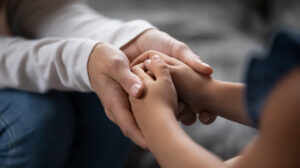Today marks the beginning of Anti-Bullying Week in England and Wales. Our largest-ever survey of children The Big Ask showed us how deeply this generation of children care about issues of equality and fair treatment in their friendships, and within their communities. In our survey, 1 in 5 children selected ‘everyone being treated fairly’ as one of their most important priorities to help them to have a good life when they grow up. Children described how bullying can impact their daily lives, and told us that they feel bullying – whether it be on social media or in the playground – can be a barrier to future wellbeing and achievement.
This week provides a great opportunity to reflect on why children see bullying as a barrier to achievement, and which factors children identify as helpful in protecting them from the harmful effects of bullying. We have also provided links at the bottom of this blog to support for both children and parents.
Barriers to Learning and Negative Self Esteem
Some of the children who referenced bullying in their answers described how bullying can be a barrier to learning, by distracting them from learning, or by making it harder to settle down in lessons and feel comfortable in school. An 11 year old boy told us:
‘In England, the education system and the way the country execute teaching is amazing; however, the things I personally find hard are the students bullying me and others this can drastically effect learning and the way you think sometimes.’
Others described how bullying can impact their self-esteem, making them feel inadequate. One 10-year-old girl told us:
‘Bullying because they will just give up and be like they are the problem in this world and just be like I’m nothing to anyone and I don’t deserve to be here.’
Online Bullying
This generation described feeling unable to escape peer-on peer bullying after the school day, with many children being exposed to instances of bullying on social media when they are outside of the school gates:
‘Education is one of the most important things as well as good friends and a safe environment. One thing stopping that I believe, is social media. Social media means that you can even be bullied at home.’ – Boy, 12
Children described online bullying as a barrier to achievement. They described how it can be difficult for schools to intervene in instances of online bullying, as schools have limited ability to influence the online space children are interacting in:
‘Online safety. Just a few days ago some person pretended to be one of my friends online and started saying rude stuff. I know they are from my year but my teacher can’t help because we don’t know who they are.’ – Girl, 12
Children told us of the things that made them feel supported if they were being bullied
Children identified some protective measures that help them manage the impact of bullying. Feeling supported and valued by family and friends can protect against the harmful impact of bullying, by building children’s self-esteem and happiness:
‘I think that some children get put down from bullies and low self-esteem on themselves. They need good friends and family to help them feel safe and happy again and make them believe in themselves.’ – Girl, age not given
Children said schools had an important role in protecting them from bullying – demonstrating the positive role schools can have in helping children feel safe:
‘I think it is important to stop bullying before it starts to progress and get worse because it starts affecting children’s physical and mental health. As I have experienced this I know how it feels to be worried to go to school, because you fear that you will be bullied again.’ – Girl, 11
In some schools, mental health leads are being trained up to help develop a ‘whole school approach’ to mental health. This means mental health is embedded across all policies, training, curriculum and staff practice, so that schools promote well-being across the board. So far £9.5million has been made available to train up 7,800 senior mental health leads in schools. These support structures can provide important relief to children.
Anti-Bullying Resources and Help
There are lots of resources to help you, your child or your class if they are being affected by bullying in the online or offline world.
Resources for children:
- Kidscape provides help and practical advice for children experiencing bullying.
- Young Minds provides advice on how to tell someone what you are experiencing and get help.
- The Mix offers support to anyone under 25 about anything that’s troubling them. Email support is available via their online contact form. Free 1-2-1 webchat service available. Free short-term counselling service available. Opening times: 4pm – 11pm, seven days a week 0808 808 4994
Resources for parents:
- Internet Matters provides practical tips and tools you can use to teach your child how to make smarter and safer choices as they navigate their online world.
- The Anti-Bullying Alliance advises parents who are concerned their child is being bullied, or if their child has been accused of bullying.
Resources for schools:
- The Anti-Bullying Alliance provides free resources for Anti-Bullying Week, for both Primary and Secondary schools.
- The NSPCC provides learning packs for schools on a range of bullying prevention strategies, including supporting parents with online bullying.






